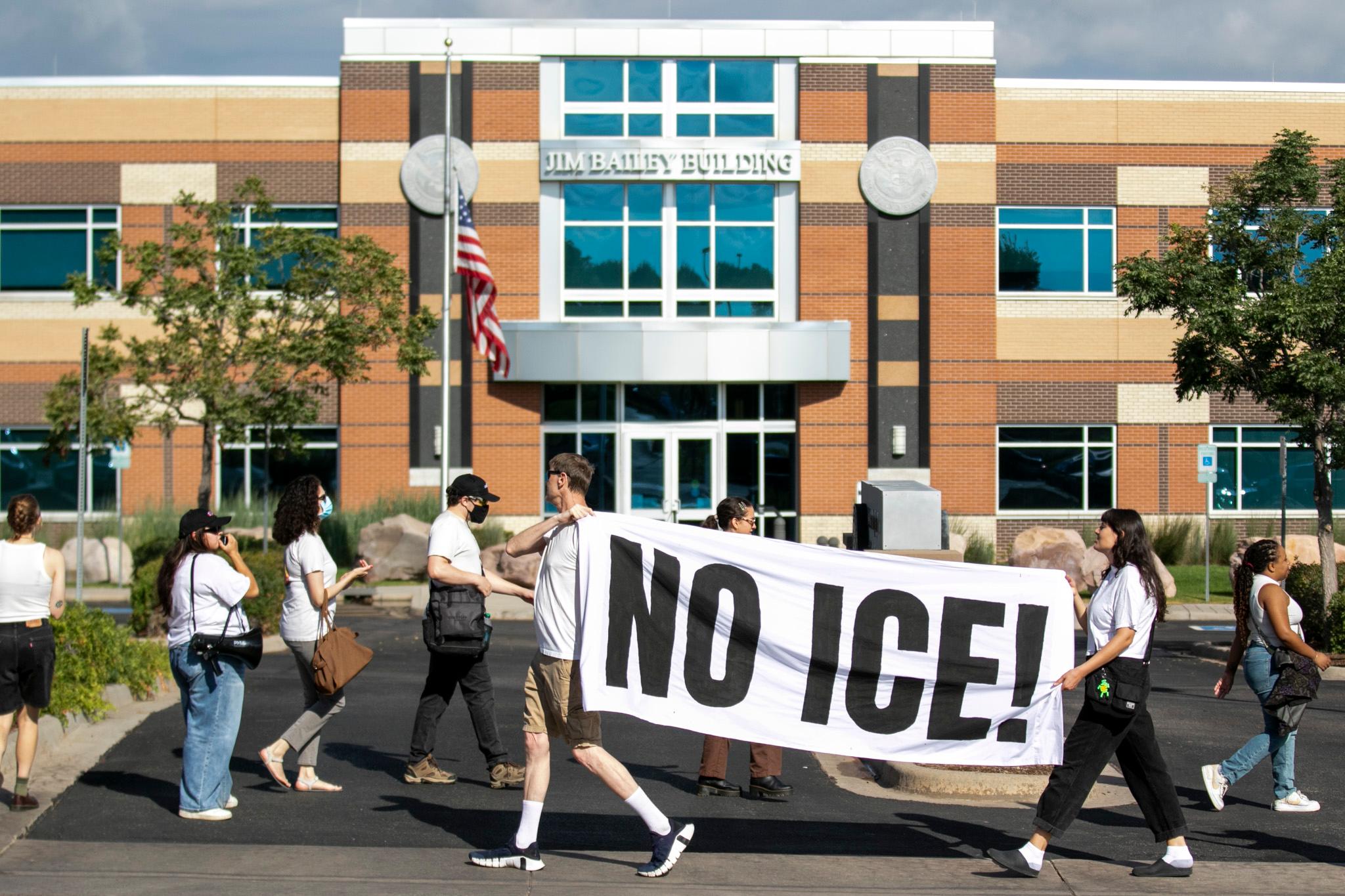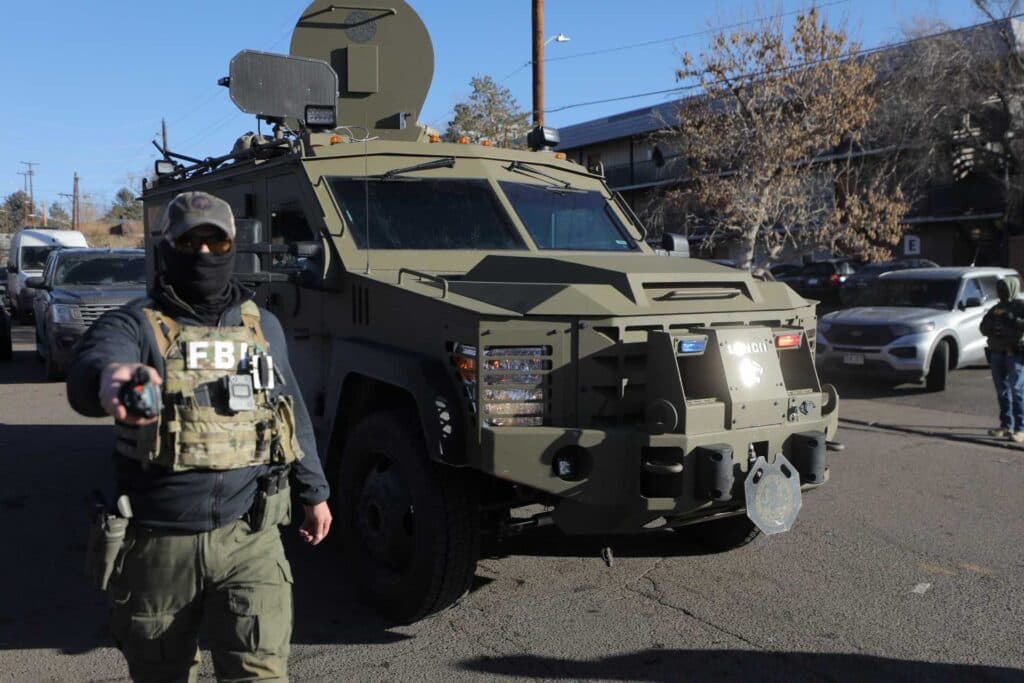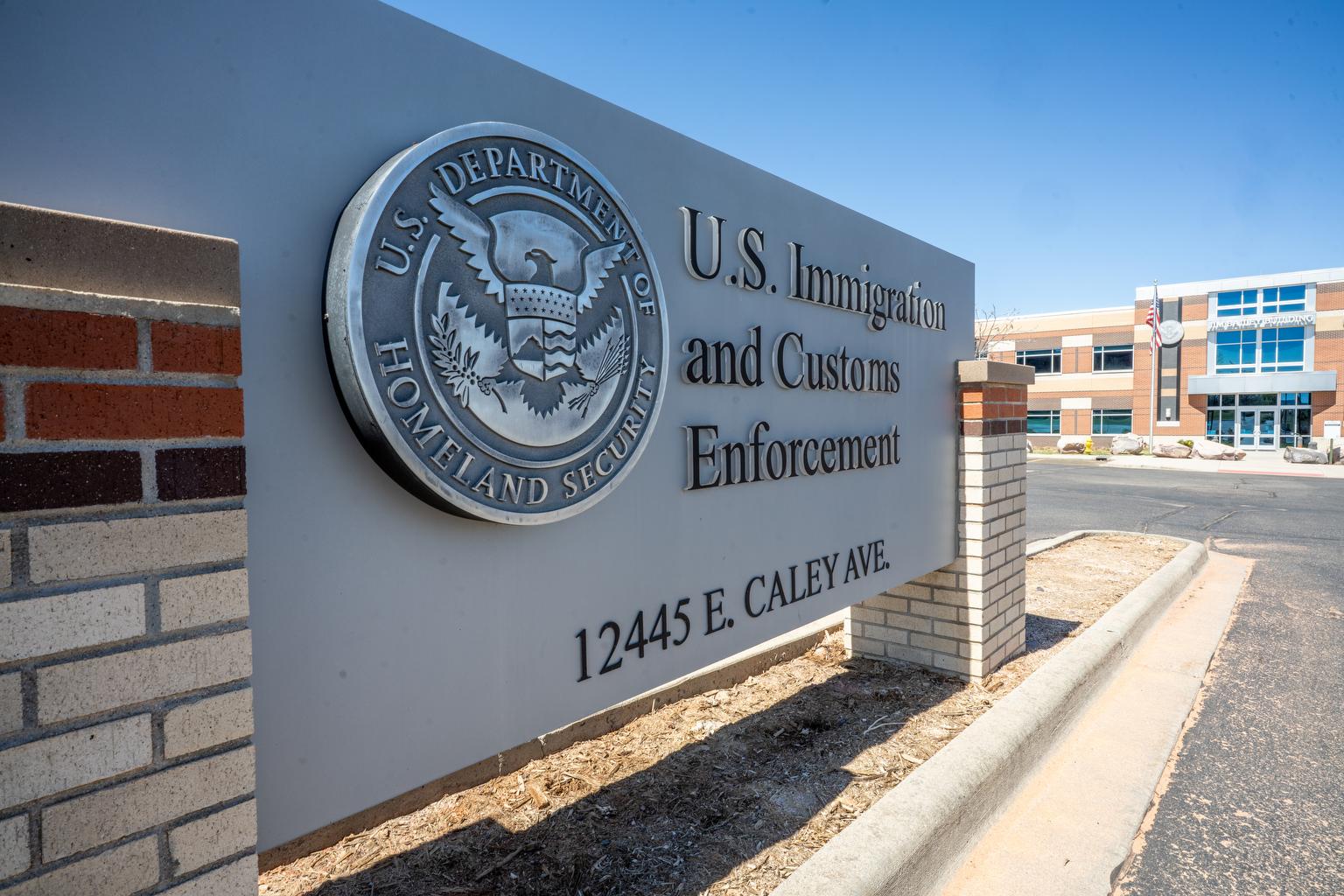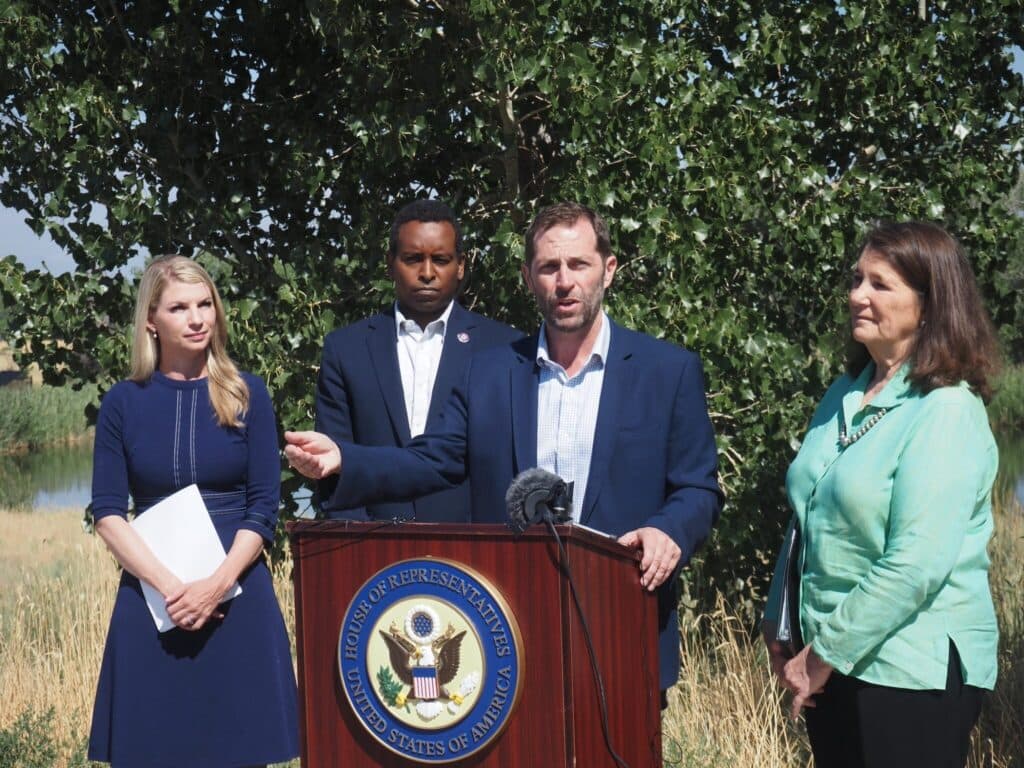
Updated at 5:05 p.m. on Friday, October 24, 2025.
Over the last several months, Nicholas Pierce’s work as an asylum, refugee and deportation defense lawyer on the Front Range has meant playing catch-up. The immigration policies and orders that seem to come on a near-daily basis from the federal government have been hard to keep up with.
In a recent interview, Pierce tried to make sense of the latest effort by Immigration and Customs Enforcement, which activists said was called "Freaky Friday," offering unaccompanied immigrant children cash to self deport, and potentially depriving them of the right to hearings. A local human services agency had reached out to him earlier in the day asking how it would impact the young immigrants in their care.
He couldn’t answer. Instead he had to turn to others, including a contact at ICE, to figure it out.
“It is, in a lot of ways, much worse than what I had anticipated, much faster than I had anticipated,” Pierce said about the impact the president’s immigration crackdown has had on Colorado. “I was an immigration lawyer during the first Trump administration, and there was just a lot more checks and balances in the system.”
With about 400 cases on his plate through his Denver-based firm Amistad Law, Pierce said he’s seen firsthand how families and communities are being torn apart. He said many have had their legal statuses stripped away, through things like ending Temporary Protected Status for Venezuelans – many of whom sought refuge in Colorado. Others, he said, have chosen to go into hiding for fear of being detained when appearing for their asylum interviews.
Pierce, who is a former U.S. Army Reserve service member and whose work receives state funding through the Colorado Refugee Support Program, is one of hundreds of Coloradans polled by CPR News and other outlets in the Colorado News Collaborative who have expressed either complete opposition to or frustration with some of the ways Trump has carried out his campaign promise to close the southern border and reduce the number of undocumented immigrants living in the country.

A small number we heard from say they support the president’s actions, calling them necessary to free up government resources for things like housing and Medicaid for citizens or protect the country from socialism.
Since the beginning of the year, the Trump administration has increased immigration raids across U.S. cities, including in Colorado, escalated tactics like sending the National Guard to back up ICE in Los Angeles and Washington, D.C., and reversed Biden-era policies, including allowing arrests at schools and churches.
What Coloradans are saying about immigration
In the survey circulated by Colorado newsrooms, including CPR News, a majority of the nearly 400 respondents said that, even if they supported some of the president’s stated goals, they opposed some of the immigration enforcement tactics currently being used by federal agents.
Specifically, Coloradans take issue with federal agents violating due process and not focusing on deporting the “worst of the worst” criminals.
“I have no problem with deporting those convicted of felonies, but ambushing families is despicable,” said a woman in Grand Junction.
“I am in favor of the overall goal, but I do take issue with some of the practices,” said a man from Broomfield. “Treat people as human beings, even if they are criminals.”
A man in Durango summarized it like a report card. He gave efforts to close the border an A+, deporting criminals a C-, visa restrictions a D-, the use of Immigration and Customs Enforcement an F and described the use of the National guard as illegal. He said Trump also failed in the area of “Politicalization.”
“Deport criminals not workers,” said a woman in Durango. ICE tactics like “unmarked cars, civilian clothes, refusal to identify themselves should be eliminated.”
“It's a waste of time to deport people contributing to the economy,” said a man in Colorado Springs. “I'm more concerned with the affordability of housing and health care.”
“The response has been too extreme and brutal,” said a woman in Colorado Springs. “It targets too many law-abiding, legal, U.S. residents, denying due process to detainees.”

Evergreen resident Norman Sherbert said he believed the president was carrying out what he promised to do when elected and correct the previous administration’s actions.
“I’m not here to tell the government how to do their job,” Sherbert elaborated via email. “All I know is that 11 or 12 million illegal immigrants coming into our country, seeing pictures of the masses of people standing at our borders, and hearing of children without guardianship being used to gain entrance into the U.S. is not good policy. And, in the long run over the next generations, will have a deteriorating effect on our society and way of life.”
Sherbert sees the administration’s extreme measures as a necessary way to right the situation with the limited time and resources it has.
At a flea market in Colorado Springs on a recent weekend, JoAnn Antaya said she believed Trump wanted to help people during his first administration but doesn’t agree with the tactics being used today.
A German-born American who remembered how difficult it was to adjust to a new culture as a child, Antaya believes society has lost its compassion.
“We do not care about our fellow man,” Antaya, 63, said. “So it's easy to put a wall between here and Mexico because you know what? They have nothing to do with you. Heaven forbid if you should hand them a crust of bread. No, I'm not happy with my country.
“It's like they're not compromising. They're not coming to a happy medium. They're just combative. And that's all it is: Argument, argument, argument.”

What the polls say about immigration concerns
Opinion polling suggests how Coloradans feel about immigration has a lot to do with where they live.
A poll from the Colorado Health Foundation released earlier this year looked at top issues facing Coloradans. It surveyed over 2,300 people across the state.
It found that “illegal immigration” was a major concern for about half of the residents surveyed, though the extent of the concern depended on where respondents lived, lower in urban areas (39 percent), versus suburban (58 percent) and rural (65 percent).
Ninety percent of respondents on the Eastern Plains believe illegal immigration is a problem in Colorado compared to 46 percent in Denver metro.
On the flip side, 20 percent of all respondents said the mistreatment of immigrants was an "extremely serious” concern compared to 42 percent of respondents saying it was “not too serious.”
Broken down by region, that concern fluctuated, with 44 percent of urban respondents saying mistreatment is extremely or very serious compared to 30 percent of suburban respondents and 23 percent of rural respondents.
“The regional, the urbanity and the partisanship seemed to really be driving how folks react to those problems and react differently to the two different framings that we tested,” said Lucia Del Puppo, senior vice president with the research firm that conducted the Pulse Poll.
CHF spokesperson Katie Peshek says Pulse Poll findings are shared with policymakers to help them understand the real issues residents are facing and prioritize those concerns.
“With a third of poll respondents pointing to government and politics as the state’s leading challenge, it’s clear that on issues like immigration, the cost of living and housing, Coloradans are ready for real action and solutions,” Peshek said.

Meanwhile, a national Gallup poll released this summer found that only 30 percent of Americans say immigration should be reduced, a position that has shrunk by fifteen points since last year.
But the support for staunching immigration largely falls along party lines, with the poll finding “Republicans are the only group still showing at least plurality support for reducing immigration.”
In a recent national poll of registered voters by the New York Times/Sienna, “51 percent said they thought the government was deporting mostly people who ‘should be deported,’ while 42 percent said the government was deporting the wrong people.”
That poll, too, found respondents wrestling with the administration’s aggressive tactics.
“More than half of voters, 53 percent, think the process of deporting people has not been fair; 44 percent said it was mostly fair,” according to The New York Times.
How Colorado leaders are responding to federal actions
Some Coloradans praised the work of elected officials to stand in the way of federal immigration enforcement.
Colorado Attorney General Phil Weiser has used his office’s powers to fight against federal immigration actions, from defending in-state tuition for noncitizen students to suing a sheriff’s deputy for involving ICE in a traffic stop that resulted in the detainment of a college student.
In the spring, state lawmakers passed a bill designed to protect undocumented immigrants from coming to the attention of federal authorities. And over the summer, Colorado’s Democratic members of Congress toured the state’s only immigration facility in Aurora, only to leave with more questions than answers.

Colorado governments are in danger of losing federal funds and the state is being sued by the federal government for so-called sanctuary policies, but Democratic leaders have so far resisted the administration’s pressure campaign, arguing immigration enforcement is not the state’s problem.
That doesn’t mean inter-agency coordination isn’t happening. Despite state laws strictly limiting when officials can cooperate with ICE requests, state agencies were found to have provided federal immigration officials with Coloradans’ personal information in response to subpoenas several times this year. Those actions by the Polis administration have riled fellow Democrats and immigration advocates.
Looking ahead
Even though state laws prohibit local law enforcement from helping federal agents, targeted immigration raids continue to take place across the state, including outside of metro regions. In the last couple of weeks, local news outlets have reported on an incident in Alamosa where ICE detained a family with a baby inside a vehicle at gunpoint, smashing a car window, and a situation in Routt County where a county commissioner was blocked by ICE vehicles.
For Pierce, it’s not just new policies that have made it difficult for him – or other lawyers – to do this job. He’s seen announcements of immigration court judges resigning or being fired, resulting in longer processing times for cases. Clients are also being transferred to detention facilities out of state, making it hard to connect with their legal counsel and putting them at risk of being deported within days.
“So when it comes to hurting people, the system's gotten a lot faster. When it's come to helping people, the system's gotten a lot slower,” he said.
The majority of Pierce’s cases involve Afghan men who fought alongside the U.S. military during the Afghanistan War and are now waiting to get legal residency. Most of them filed petitions in 2022 or 2023 but still don’t have a court date set. With the reimposition of the so-called Muslim ban by the Trump administration this summer, it has been difficult for them to be reunited with their families. Pierce says these policies betray a promise made by the U.S. government for fighting alongside its troops.
The situation is leaving the men with two options: risk likely death to join their families back home or wait in the U.S, in the hope that their families will eventually be allowed to join them.
It’s gotten so bad that Pierce has found himself for the first time ever advising people to seek asylum in Argentina or Chile. He’s even started to offer powers-of-attorney services so that family or friends with U.S. citizenship can take control of bank accounts and other assets if their loved ones are rapidly deported.
“I've dedicated my life to this, but the good legal advice has become, ‘Hide, or go somewhere else.’”
Editor's note: This story has been updated to clarify the war that Nicholas Pierce's clients fought in. They fought in the Afghanistan War.
- Claims of huge rise in assaults against ICE drive responses, but aren’t seen in available data — October 2025
- Dozens protest potential ICE detention facility near Walsenburg — August 2025
- Colorado Latinos rank economy, immigration and health care as top concerns in new poll — August 2025
- As GOP Rep. Gabe Evans seeks reelection, he’ll have to contend with his voters’ complex views on immigration — July 2025
- Election Day is right around the corner. Here’s what thousands of Coloradans told us matters to them most — November 2024








